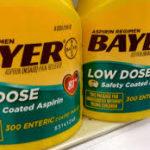
It has been standard practice with patients on antiplatelet and antocoagulation therapies to cease these medications at least one week before elective surgery. This is a preventative measure to reduce the risk of adverse bleeding during surgery and the development of hematomas after surgery. This is understandable given that many plastic surgeries are elective and the timing of them can be changed around the use of certain medications.
In the Online First edition of the November/December 2014 issue of the JAMA Facial Plastic Surgery journal, an article entitled ‘Anticoagulant Complications in Facial Plastic and Reconstructive Surgery’ was published. In this paper, the authors sought to determine what the complication rates were for a variety of facial plastic surgery procedures who were on antiplatelet (aspirin) and/or anticoagulation (coumadin) therapies. From a pool of 640 patients (320 on one of these medications and 320 who were not), complications from their surgeries were evaluated. Forty two (42) patients (13%) who were on anticoagulant or antiplatelet medication during surgery had at least one complication compared with 52 (16%) of patients who were on no medications. Five patients in each group had a severe complication (1.6%).
Patients on aspirin at the time of surgery were not more likely than those who were not to have a complication. Patients on aspirin and Plavix also didn’t have increased complication rates. In contrast, patients who were on Coumadin had increased bleeding during surgery and higher infection rates after. Other complications such as wound separation and skin flap viability were not increased with Coumadin use however.
The most relevant finding in this paper is that patients can safely undergo elective facial plastic surgery while on aspirin. Give that many patients are on aspirin for pure prophylactic purposes and would suffer no harm from being off of it, I would still advise patients to stop it before surgery. But if there is a medically compelling reason to be on it, then it appears to pose no increased risks for numerous facial procedures
The use of coumadin, however, is a different story. This study shows that the risk of bleeding and infection are higher, which is not surprising, and thus staying on this degree of anticoagulation for any elective facial plastic surgery seems like an unwarranted risk.
Dr. Barry Eppley
Indianapolis, Indiana


